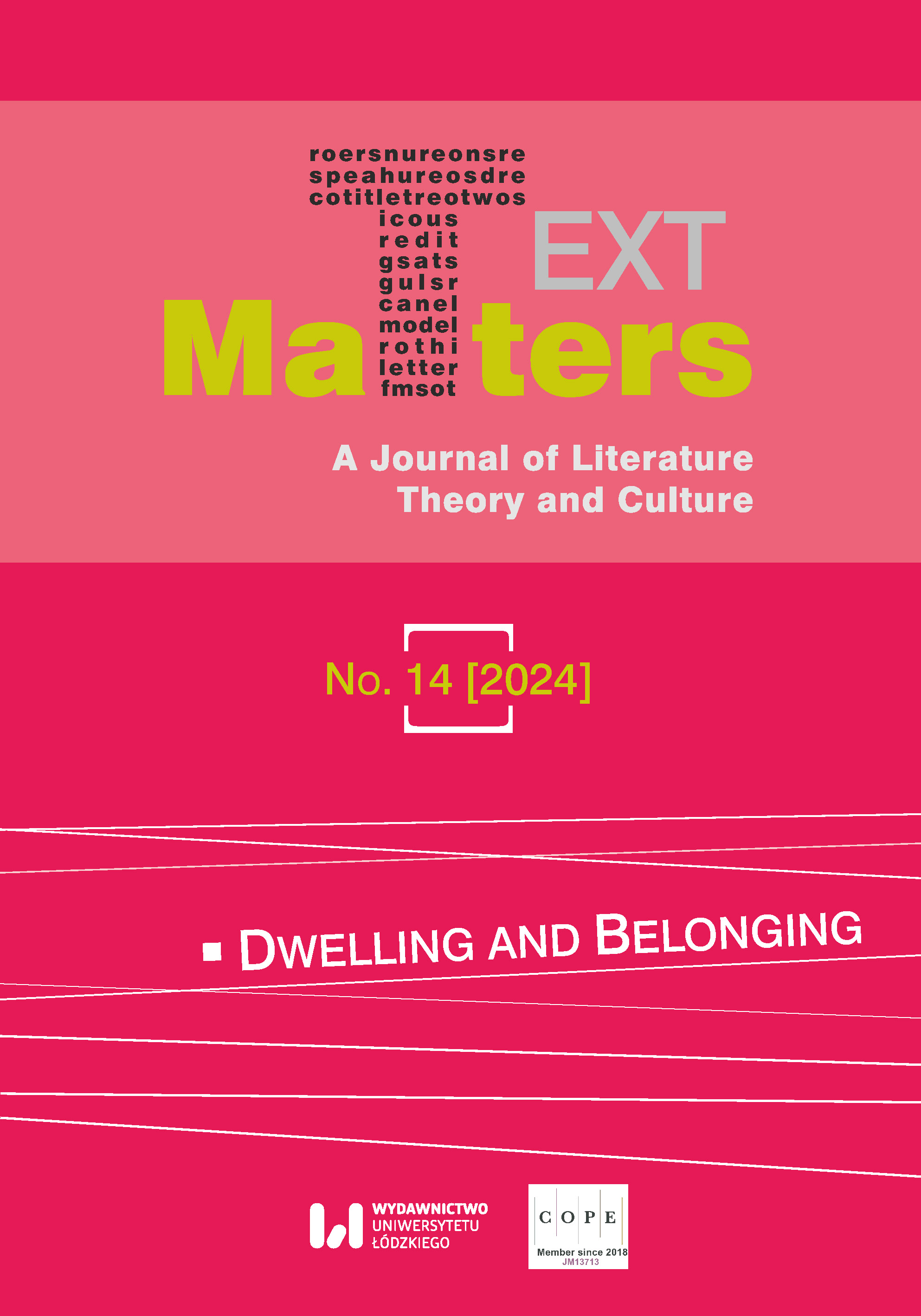Cities and Their People: Dwelling in the Anthropic Time of N. K. Jemisin’s New York
DOI:
https://doi.org/10.18778/2083-2931.14.09Keywords:
dwelling beyond human sociality, anthropic time, urban subjectivity, anti-entropic locality, N. K. Jemisin’s The Great Cities seriesAbstract
The article starts with Martin Heidegger’s 1951 essay “Bauen Wohnen Denken,” recently rethought by Jeff Malpas in his book Rethinking Dwelling from today’s perspective of urban and metropolitan dwelling. However, while defining dwelling relationally, the Australian philosopher still thinks about the human as a being-in-place in a traditional, human-centred way. Thus he overlooks how tightly humans are entangled with more-than-humans: with biological, geological, and technological entities and agencies. For this reason, the article tackles a further rethinking of dwelling beyond human sociality, or even queering it beyond binary thinking to better depict what it proposes to call urban subjectivity. Reading N. K. Jemisin’s recent novel duology The Great Cities, the article argues that urban subjectivity is a distributed phenomenon, which both incorporates and elaborates on more-than-human elements. In so doing, urban subjects share a sociality not only with the animal and geological but also with technological forces and their territorial exorganic functions as an agency of anti-entropic locality (Bernard Stiegler’s “anthropic life”). Thus, creatively approached technology as a pharmakonian form of organogenesis and Derridian différance may help us keep the entropic and neganthropic forces in balance, as pertinently demonstrated in Jemisin’s duology.
Downloads
References
Haraway, Donna J. Staying with the Trouble: Making Kin in the Chthulucene. Duke UP, 2016. https://doi.org/10.2307/j.ctv11cw25q
Google Scholar
DOI: https://doi.org/10.2307/j.ctv11cw25q
Heidegger, Martin. “Bauen Wohnen Denken.” Poetry, Language, Thought, translated by Albert Hofstadter, Harper Colophon, 1975, pp. 143–62.
Google Scholar
Ingwersen, Moritz. “Geological Insurrections: Politics of Planetary Weirding from China Miéville to N. K. Jemisin.” Spaces and Fictions of the Weird and the Fantastic: Ecologies, Geographies, Oddities, edited by Julius Greve and Florian Zappe, Palgrave Macmillan, 2019, pp. 73–92. https://doi.org/10.1007/978-3-030-28116-8_6
Google Scholar
DOI: https://doi.org/10.1007/978-3-030-28116-8_6
Ivry, Henry. Transscalar Critique: Climate, Blackness, Crisis. Edinburgh UP, 2023. https://doi.org/10.1515/9781399506489
Google Scholar
DOI: https://doi.org/10.1515/9781399506489
Jemisin, N. K. The City We Became. Orbit, 2020.
Google Scholar
Jemisin, N. K. The World We Make. Orbit, 2022.
Google Scholar
Lemmens, Peter, and Yuk Hui. “Reframing the Technosphere: Peter Sloterdijk and Bernard Stiegler’s Anthropotechnological Diagnosis of the Anthropocene.” Krisis: Journal for Contemporary Philosophy, no. 2, 2017, https://archive.krisis.eu/reframing-the-technosphere-peter-sloterdijk-and-bernard-stieglers-anthropotechnologi-cal-diagnoses-of-the-anthropocene/ accessed 15 Jan. 2024.
Google Scholar
Malpas, Jeff. Rethinking Dwelling: Heidegger, Place, Architecture. Bloomsbury, 2021. https://doi.org/10.5040/9781350172944
Google Scholar
DOI: https://doi.org/10.5040/9781350172944
Povinelli, Elizabeth A. Economies of Abandonment: Social Belonging and Endurance in Late Liberalism. Duke UP, 2011.
Google Scholar
Povinelli, Elizabeth A. “On Biopolitics and the Anthropocene. Interviewed by Kathryn Yusoff and Mat Coleman.” Society+Space, 7 Mar. 2014, https://www.societyandspace.org/articles/on-biopolitics-and-the-anthropocene accessed 15 Sept. 2023. https://doi.org/10.1515/9780822394570
Google Scholar
DOI: https://doi.org/10.1515/9780822394570
Stiegler, Bernard. The Neganthropocene. Edited and translated by Daniel Ross, Open Humanities, 2018.
Google Scholar
Yusoff, Kathryn. “Geologic Subjects: Nonhuman Origins, Geomorphic Aesthetics and the Art of Becoming Inhuman.” Cultural Geographies, vol. 22, no. 3, 2015, pp. 383–407. https://doi.org/10.1177/1474474014545301
Google Scholar
DOI: https://doi.org/10.1177/1474474014545301
Published
Versions
- 2024-11-28 (2)
- 2024-11-28 (1)
How to Cite
Issue
Section
License

This work is licensed under a Creative Commons Attribution-NonCommercial-NoDerivatives 4.0 International License.
Funding data
-
Narodowym Centrum Nauki
Grant numbers 2021/41/B/HS6/02718













